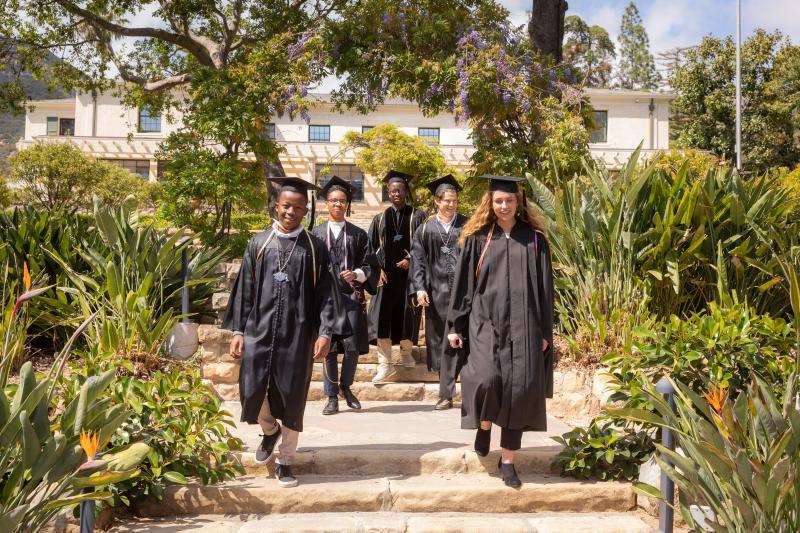Westmont Magazine I Was a Stranger, and You Welcomed Me
Six Seniors Reflect on Their Westmont Years
The class of 2020 includes the first group of Augustinian, Michaelhouse and Bridge to Rwanda scholars to graduate from Westmont. President Gayle D. Beebe spoke to six of these scholarship recipients about their experiences at Westmont.
President Beebe: Thank you for joining me. You’ve had the most unusual college experience—one we hope never to repeat. What are some of your most significant Westmont memories? What will linger in your mind forever?
Hannah: The relationships I’ve built with professors, from having dinner at Paul Willis’s house to Zooming with Dr. Richter regularly. The mentorship they’ve provided has been invaluable.
Hendrik: Studying abroad. Hannah and I went to Jerusalem together and had innumerable incredible experiences. The same with studying in Spain.
Odile: It’s been such a transformative journey learning from a new culture and navigating life with people from different backgrounds. Going to Ensenada, trips with Urban Initiative in San Francisco and Los Angeles and traveling to Thailand with Emmaus Road helped me learn from missionary groups serving different groups of people. Being immersed in the culture in Asia was such a gift.
Luvuyo: Flo and I were the start of the Michaelhouse Fellows, and seeing how that has developed with seven of us on campus and two more guys coming next year has been my favorite part of the whole experience—and seeing how much the campus has brought to us. Each of us has undergone tremendous growth. Also being exposed to the people I’ve met, like my host family—I’ll always appreciate them for the sacrifices they’ve made—and the professors.
Mfolozi: The relationships I’ve made here with my friends and my professors. I had never left South Africa, and I was scared going into a new culture—the community here at Westmont was so amazing. The hospitality, the generosity, the kindness, the care; that’s been a huge part of my time at Westmont, and I’ve never felt away from home. The mission trip I did in Mexico was eye-opening and helped me understand what I’ve been given. Westmont has enlightened me through interactions with professors and people from different socio-economic backgrounds. I’ve had an internship in D.C. and an internship here in town, and I’ve visited a lot of states.
Festo: I’m going to cherish for the rest of my life the opportunity to attend Westmont and find friends and a community that welcomes you and makes you feel right at home. We live so far away, and people have understood our struggle and given their strength to us. The opportunity to get an education and interact with professors and peers has been eye-opening. The two research experiences I did with the chemistry department helped me develop strong relationships with Dr. Michael Everest and Dr. Amanda Silberstein.
President Beebe: What’s been challenging and difficult about your experience and required you to persevere?
Hannah: I wasn’t expecting the challenge of being away from my support system at home. I always had my sights set on leaving Colorado and building my own life, but as soon as I got to Westmont, the lack of scaffolding around me became apparent. At Westmont it’s easy to rebuild that with people, professors and finding a church. I was able to tap into one of the support networks that exist here. Another challenging experience was going abroad and then coming back. Being in Jerusalem and the Middle East was challenging emotionally, spiritually and physically—we were being pushed to our limits. Westmont professors in general challenge their students to their limits. I appreciate that, but it can be tiring. Trying to figure out what I learned, how to bring it back and how it had changed me was challenging. But I think having lunch with professors and having conversation partners at Westmont helped me process the experience. I have the opportunity to go back as the program assistant in spring 2021. A lot of my hardships at Westmont have already started to bear fruit.
Hendrik: College is such a formative time for everyone. You’re addressing some of the bigger life questions, and you’re thinking about your meaning, your purpose for being here, the people you want around you. Westmont has presented me with such an amazing group of people, but you also learn so much about yourself, the good and the bad, and how to learn and grow and become the person God intends you to be. One of the most challenging moments was standing outside of Emerson and seeing the smoke from the Thomas Fire in the distance. My girlfriend asked, “Hendrik, what are we going to do?” In that moment, I was lost. I had no idea how to handle this situation. Now that we’ve had other different crises—the mudslides and the coronavirus global pandemic—I’ve begun to learn about leadership in times of extreme transition. It’s prepared me in a way I could never have anticipated.
Odile: It’s a blessing to have so many homes—in Rwanda and here at Westmont—but it’s also a challenge. I’m growing, learning and experiencing transformation, and I want to communicate that to people I left at home. Sometimes there is no easy way to do that. They are eight hours ahead, and none of them has been here. How can I explain it so when I get back there is no huge gap, we aren’t strangers and it still feels like home? COVID-19 has been a challenge too because I can’t say goodbye to my friends I will probably not see again any time soon or spend time with the families and people who’ve invested in me. We’ve been robbed of this opportunity. As international students, we’ve had to figure some things out as we go in addition to navigating school—it takes a lot of emotional labor. It’s a challenge to figure out how to be faithfully present as a student, a friend and a daughter and sister far away. I had no idea I would finish one year, but here we are four years later, and God gets the glory. I can’t see any way I made it through this journey without his protection, love and guidance through the people I’ve met.
Luvuyo: Each year had its own difficulties and its own successes. When Mfolozi and I arrived, we knew no one—and we came mid-year, which made things more awkward. We had no break after graduating from high school. We had to pack and say goodbye to our families, and it was a stressful time. Coming here to America was a step out of my comfort zone. For freshman year, I use the analogy of a house: Everyone’s inside, and there’s the yard and the gate, and I’m outside the gate looking in through the window seeing everyone having a good time as I try to enter. Eventually I entered. Then the next challenge: I didn’t have a mentor I could relate to, who could understand my experience as a South African guy, as a Black male. There were moments when my teachers and my friends couldn’t help me navigate situations—I needed an adult mentor. So I carried the burden of trying to sort it out myself. This year has been particularly tough in that I’ve made plans, but none of them has worked out—it’s been the same for everyone. I had this vision that once I hit senior year, I’d be cruising, but it feels more like freshman year. But there’s a lot I can gain from this and a lot of silver linings. So I’ve had to make peace, I’ve had to pray about some things and be content with the situation and try to make the most of it.
Mfolozi: I agree with Luvuyo on most of the things he said. Certainly the Thomas Fire, the mudslides and now the pandemic stand out. I also remember walking outside and seeing the fire at the top of the mountain. I’d never been through a wildfire, and I didn’t know how to react. I saw my car covered in ash and wondered what to do. But it worked out; Westmont has good support structures. It built my character and my resilience. The pandemic is tough for everyone worldwide, but we’re all going through this and can navigate day by day. That’s been the biggest challenge: navigating through these crises that keep coming at you when you’ve made plans and those plans fail. What happens next? How do you react to that? How do you navigate that?
Festo: I’ve faced two big challenges. The first one was one was living between two cultures. I think Bridge to Rwanda did a good job educating us about the culture in the United States, but coming and living that experience by myself was challenging. International students have a hard time navigating the social sphere at Westmont. But it’s been a great place for us and gave us space to communicate our worries, and they’ve helped us tremendously. I feel at home. I have a social group of international students I can relate to. I also have another group of students who can step away from their comforts to understand where I come from, and we can communicate and understand each other’s experiences. I’ve learned so much from people around me. The second challenge was getting too comfortable in college and not pushing myself to keep growing. I could have used my time to explore more opportunities and form many friendships. This year has challenged me to rethink how I can step out of my bubble of feeling comfortable and pursue what I need to acquire in life to be a successful person.
Dr. Beebe: We’re headed toward the victory lap. What enduring life lessons have you learned? What memories will you carry with you?
Hannah: In any new space I enter, I can ask myself who I want to be and how I want to occupy this space—and who is God calling me to be and how am I being called to be faithful where I am? I’ve gotten some good practice through the Augustinian program, which encouraged us to be intentional about our formation and about forming community around us. I’ve asked who is God calling me to be and how I can be faithful here again and again at Westmont, and I think my calling has changed. So I’ve learned to be mindful and conscious of the small ways God calls us to be faithful in our contexts.
Hendrik: The idea of a legacy comes to mind. A group of people have supported me and gone before me: donating to my scholarship; raising me; teaching me; investing in me—including the president. I’m just so thankful. Second, Dr. Covington asked us to write our eulogy our first year. What do you want people to say about you? For me, it’s about the legacy I come from and the legacy I want to establish for myself. Another lesson is the daily discipline to invest in that legacy in terms of my faith and my studies. Achieving any sort of excellence involves discipline. I’ve learned at Westmont that excellence comes from daily discipline.
Odile: People who don’t know me decided to be generous and invest in my education. That generosity makes you a better person. I look at how much I’ve transformed, how many things I’ve learned, and I would love someone else to experience this. I hope it doesn’t stop with me. For me, legacy is asking how I can pay forward what other people have done for me. They loved me when they didn’t have to—they chose to. I may not always have a choice about what happens to me, but I will always have a choice to be faithfully present. God’s love is amazing, and it’s limitless for each of us. He’s writing our stories, so there is no need to stress out. Having complete confidence in His faithfulness over our lives is another lesson Westmont has taught me. I’m trusting that the Lord will continue to pave the way for us in the direction He wants us to go, leading us know Him better, love Him better and love people around us better.
Luvuyo: The idea of legacy is important to me, and I want to leave something behind, some impact. I’m so grateful for the sacrifices other people have made for me, which I can never repay. I’ve learned to grab an opportunity and not waste it. Everyone in this circle has a chance of doing big things one day. The lesson is to make something out of that potential and not just live off it. I’ve learned to be disciplined and work hard—this place is rigorous, and it goes beyond academics. I used to think I worked hard, but this place has honestly stretched me and shown me another level of hard work. I still have a lot to learn and a long road ahead. Another lesson I’ve learned is to trust God. Many times I thought, “I can’t handle this; I can’t do this anymore.” But through all those moments, God has been there. My strength was definitely not enough in the situation, but God—and prayers from my family back home and from my friends—have gotten me through. So many people want me to succeed. That caught me by surprise. People I barely know are rooting for me. That’s been inspiring, and it’s helped me realize that I’m not just doing this for myself—it’s bigger than that.
Mfolozi: God will not bring you so far just to leave you there. God’s purpose for each of our lives is different. Wherever God has me, it’s where he wants me to be, and he has a sense of direction for my life—I just have to find that. That’s helped me throughout these challenges. I’ve also learned “to whom much is given, much will be required.” I’m looking at how I can pay it forward—how can I give to other people what has been given to me? How can I make a difference and enact change? I’m super grateful for all our sponsors have done for us.
Festo: Staying humble and being grateful are the two biggest lessons I’ve learned. A lot of people went beyond what could be expected to invest in me academically, financially and spiritually. People we don’t know prayed for us. How can I thank them? I pray that God will let me provide to others the meaningful experiences given to me. Professor Ifland said in class, “There will always be smart people wherever you are. So how can you learn from them?” You have to be humble to realize you can learn from people around you. Cultivating the virtue of staying humble and becoming a good listener can help people learn and grow around you as well. We’re growing, learning and becoming smart people, but in the end, I believe staying humble enough to learn from others will make the difference.
Dr. Beebe: Westmont will remember each of you—you’ve left a distinct mark, and we’re grateful for you. We’re thankful you’ve so deeply invested in the programs and people that have benefited you. You’ve made an enduring contribution to the college, and we celebrate you.
Meet the Graduates
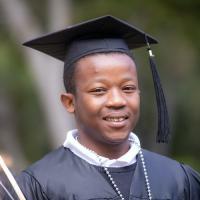
Data analytics
South Africa
Michaelhouse Scholar

Math and philosophy
Denver, Colorado
Augustinian Scholar

Economics and business
South Africa
Michaelhouse Scholar
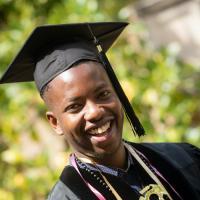
Biochemistry and biology
Rwanda
Bridge to Rwanda Scholar/Augustinian Scholar
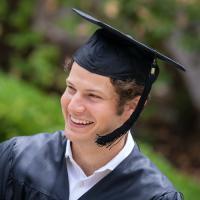
Economics and business and history
Lake Oswego, Oregon
Augustinian Scholar
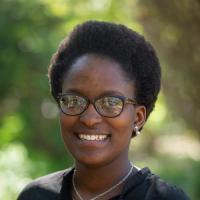
Biochemistry and biology; pre-med
Rwanda
Bridge to Rwanda/Augustinian Scholar
